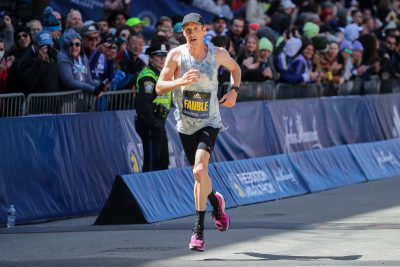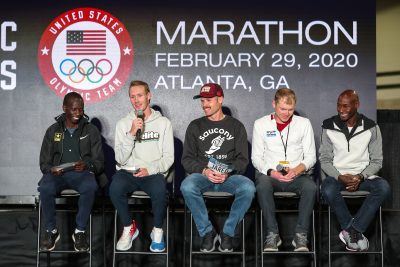Scott Fauble Is Aiming for the Olympic Standard at Berlin Marathon
By Jonathan GaultFauble will hope to become first American man to hit 2:08:10 Olympic standard in Sunday’s race
Scott Fauble was not planning on running a fall marathon in 2023. On April 17, he finished 7th at the Boston Marathon to earn top American honors — just as he did in Boston and New York in 2022. His time of 2:09:44 represented the fourth sub-2:10 of his career, making him just the seventh American to accomplish that feat after Ryan Hall, Galen Rupp, Meb Keflezighi, Khalid Khannouchi, Alberto Salazar, and Mbarak Hussein. In previous years, a top-10 finish at a World Marathon Major counted as an automatic qualifying standard for the Olympic marathon; Fauble, with three straight top-10 finishes on his resume, figured he was in good position for Paris and could shift his focus to the US Olympic Trials in February 2024.
But the Olympic qualifying system for 2024 is far more complicated than in previous years, with ever-shifting world rankings and things like “quota reallocation places” creating confusion among fans and athletes alike. Any athlete ranked in the top 65 of the filtered “Road to Paris” list on January 30, 2024, is considered qualified…except the “Road to Paris” list does not currently exist. After Boston, Fauble, who is currently ranked 122nd* — that’s in the world rankings, which is a different list than “Road to Paris” — tried to take a closer look at where he stood, creating spreadsheets and projecting where he might rank after accounting for time qualifiers, the three-athlete-per-country limit, and potential changes after the 2023 fall marathon season. After a while, his brain began to hurt.
“I felt like the Pepe Silvia meme from It’s Always Sunny in Philadelphia,” Fauble said. “…It was like, this is complicated and stressful and I can just get the standard. This doesn’t need to be an issue.”
That is why Fauble, begrudgingly, made the decision to run the Berlin Marathon. He was not initially looking forward to the race, but with a strong training block in Boulder behind him and the race just four days away, he has changed his tune.
“I’m very excited,” Fauble said. “I wasn’t planning on doing a fall marathon after Boston and I had to figure out ways to get excited for it and I think that’s one of the things that has fired me up, actually seeing how fast I can go and pushing for a PR as opposed to letting the race play out and seeing what I can do.”
Chasing a time is a dramatically different approach to Fauble’s typical marathon M.O. Of the nine marathons he has run, only two have featured pacemakers: his debut in Frankfurt in 2017, and the Marathon Project in 2020. When Fauble runs Boston and New York, the hilly courses where he has found the greatest success, he does not enter with a goal time in mind. Instead, Fauble will wait until the race begins and assess a number of factors — the weather, how he’s feeling, how fast the other runners are going — before deciding which pace to run. Typically, that has led to Fauble letting the leaders go early and picking off stragglers as they fade over the second half of the race.
Berlin will be different. There are no hills to account for, and while Fauble will still fight for every place, he is not hiding the fact that the primary goal of this race is to hit a time. Specifically, the Olympic standard of 2:08:10. Only five Americans have ever bettered that time in history, but Fauble, who ran his personal best of 2:08:52 in Boston in 2022, believes he is capable of doing it.
“I don’t think that me running in the 2:07s is a huge stretch of the imagination,” said Fauble, who has removed some of the hillier routes from his training under coach Joe Bosshard but has otherwise prepared similarly for Berlin as he would Boston or New York. “I think I’ve been in that kind of shape a bunch of times.”
The pace groups will not be finalized until the technical meeting later this week, but Fauble will have no shortage of people to run with. There are 20 men entered in Berlin with personal bests between 2:08:00 and 2:11:00, most of whom, like Fauble, will be looking for the Olympic standard.
“I’m sure there will be a 2:02-2:03 group, I know there will be a 2:08:00 group, and I think there will be one group in the middle there,” Fauble said. “And if that middle group is more 2:07:00, 2:07:30, then I could see myself going with that. And if it’s more like 2:06:30, 2:06:00, then probably going with the 2:08:00 group.”
***
Every American marathoner will be rooting for Fauble
Currently, no male American marathoner has earned the 2024 Olympic standard — either by hitting the time standard of 2:08:10 or by finishing in the top five of a Platinum Label Marathon (which includes Berlin). It’s likely someone such as Fauble or Conner Mantz will be ranked in the top 65 of the “Road to Paris” list at the end of January, but with the Olympic Trials less than five months away, US marathoners are getting antsy.
American pros rarely run the Berlin Marathon, typically opting for Chicago or New York in the fall — both of which pay much bigger appearance fees to American runners. But this fall, many are bypassing New York because of the date (just 13 weeks before the Trials) and the course (too slow for a shot at the Olympic standard). A sizeable crew, led by Mantz and Galen Rupp, will be in Chicago, while a far larger number than usual have opted for Berlin.
Berlin’s course is just as fast as Chicago’s, if not faster. It’s also two weeks before Chicago — an extra two weeks to prepare for the Trials — and the weather is typically a little better in Berlin than Chicago. That’s why Keira D’Amato opted for Berlin over Chicago for her American record attempt last year. It’s also why 60:02 half marathoner Teshome Mekonen — another American targeting the Olympic standard this fall — chose Berlin over Chicago.
In addition to Fauble and Mekonen, the 2023 Berlin field also includes 2016 Olympian Jared Ward, 2021 Olympian Jake Riley, and Tyler Pennel, who has finished 5th and 11th at the last two Olympic Marathon Trials. All of them will be looking to run fast. And every other American marathoner will be hoping they do the same.
That’s because of a new provision in the Olympic qualification system which states that any country with three qualified athletes may choose to send any three athletes it wants to Paris — as long as they have run at least 2:11:30 (men) or 2:29:30 (women) within the qualifying window. That’s why every American will be rooting for Fauble and others to run fast this fall: if the US has three athletes with the standard, then anyone who has run under 2:11:30 has the opportunity to make the team by finishing in the top three at the Trials.
The above provision, which World Athletics is referring to as “quota reallocation” means that someone such as Fauble could run the Olympic standard and open up a spot in Paris for an American athlete who ends up beating him at the Trials — thus taking a spot that would not otherwise be available had Fauble not run the standard. Fauble, obviously, is hoping such a scenario does not come to pass. But he is aware of the possibility and has accepted it as part of his reality.
“I don’t mind it,” Fauble said. “Sports have never really been about identifying the best team or the best athlete. They’re an entertainment product and they overemphasize very specific days on the calendar. Even if I was the only one with the standard and I get beat at the Trials, the 73-9 Warriors didn’t win the NBA title that year. You’ve gotta do it on the big days. That’s what being a professional athlete is about.”
***
Fauble on a noon start for the Olympic Marathon Trials: “Just tell us it’s for the TV window and tell us to suck it up”
Speaking of entertainment products, Fauble has some thoughts on the Olympic Marathon Trials, which will be held on February 3 in Orlando. In August, USATF announced the men’s race at the Trials would start at 12:10 p.m. ET with the women to follow at 12:20. Immediately, a number of top contenders such as Emily Sisson and Sara Hall expressed concern about the potential for unsafe conditions — in 2022, the temperature 81 degrees in Orlando at 2 p.m. on February 3.
Initially, Fauble thought it was a little dramatic to be worrying about the weather six months from race day. But as he looked through historical weather data for Orlando in early February, he grew more concerned.
“It could be hot to the point where the event gets compromised and people get put potentially in a dangerous situation,” Fauble said. “…They’re already facing one lawsuit from an athlete that was overexposed to heat. This could be so easy. Just give yourself less of a headache.”
While the USATF Board unanimously recommended Chattanooga as the host of the 2024 Trials in October 2022, the USATF national office, headed by CEO Max Siegel, ultimately makes the call and chose to go with Orlando while disqualifying Chattanooga’s bid over a conflict of interest.
Fauble said that, a while back, he was among a group of athletes that fill out a USATF survey about what they’d like in an Olympic Trials host. He answered questions like “flat course or hilly course?” and “major city or midsize city?” It was not a specific Orlando versus Chattanooga survey, but Fauble says that, based on the way he answered the questions, he now feels as if he voted for Chattanooga.
“Once you do the survey and you hear where they’re considering, you can kind of reverse-engineer it,” Fauble said. “They can ask for our feedback…I don’t think they care about it that much.”
Regarding the start time, USATF is in a difficult spot. A start time at 7 or 8 a.m. ET might be better for athletes, but USATF has more than the athletes to think about. The assumption is that USATF chose a noon ET start so that the race can be shown live on NBC to the largest possible audience (a 7 a.m. ET start would draw virtually no viewers on the West Coast). But so far, USATF has not offered any explanation, and that lack of transparency is Fauble’s biggest gripe.
“USATF has always billed this as an athlete’s event,” Fauble said. “They say we do this for the athletes, they make this big thing about how great the athlete experience is going to be. Just say that’s bullshit…I just wish they didn’t blow smoke up our ass about telling us about athlete experience. Just tell us it’s for the TV window and tell us to suck it up if that’s really what you guys think.”
Talk about Fauble and Berlin on the world-famous Letsrun.com messageboard.
- Scott Fauble, who wants a 2:07 in Berlin, on USATF: “(Don’t) blow smoke up our ass about telling us about athlete experience.”
- Official BERLIN MARATHON 2023 predictions
*Fauble is currently 39th in the rankings if you limit it to three per country but that doesn’t include any auto qualifiers not in the rankings. Plus Fauble’s 2022 Boston result will come off the rankings before Paris as it has to be in the last 18 months.











